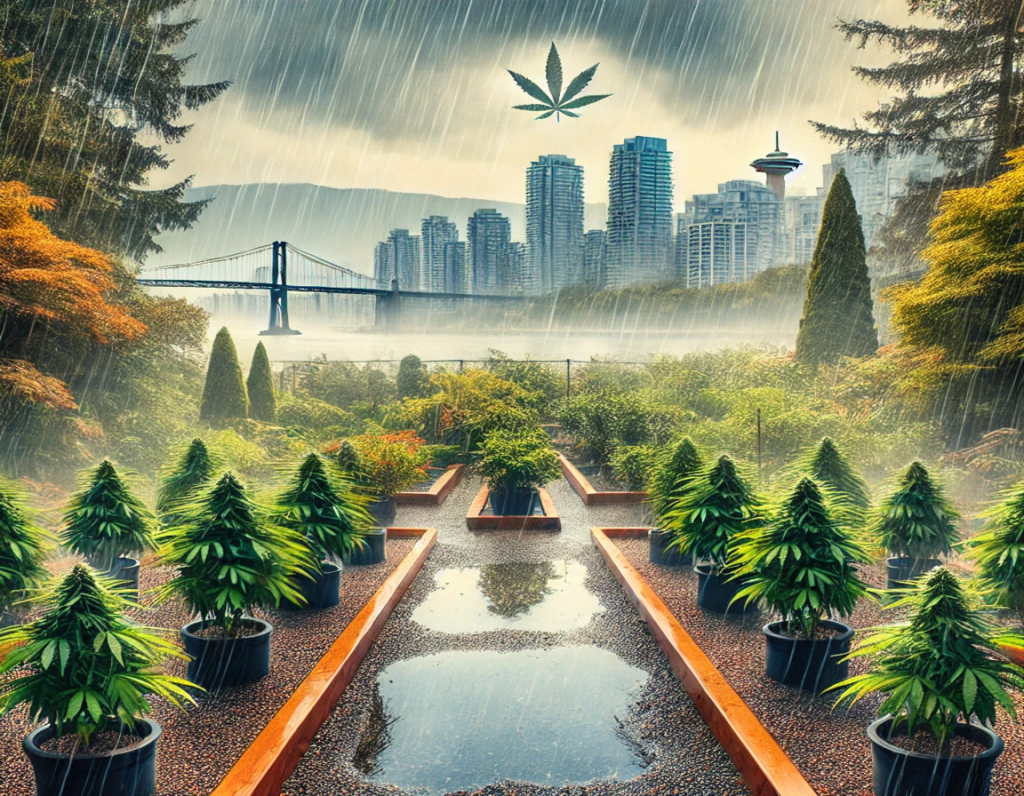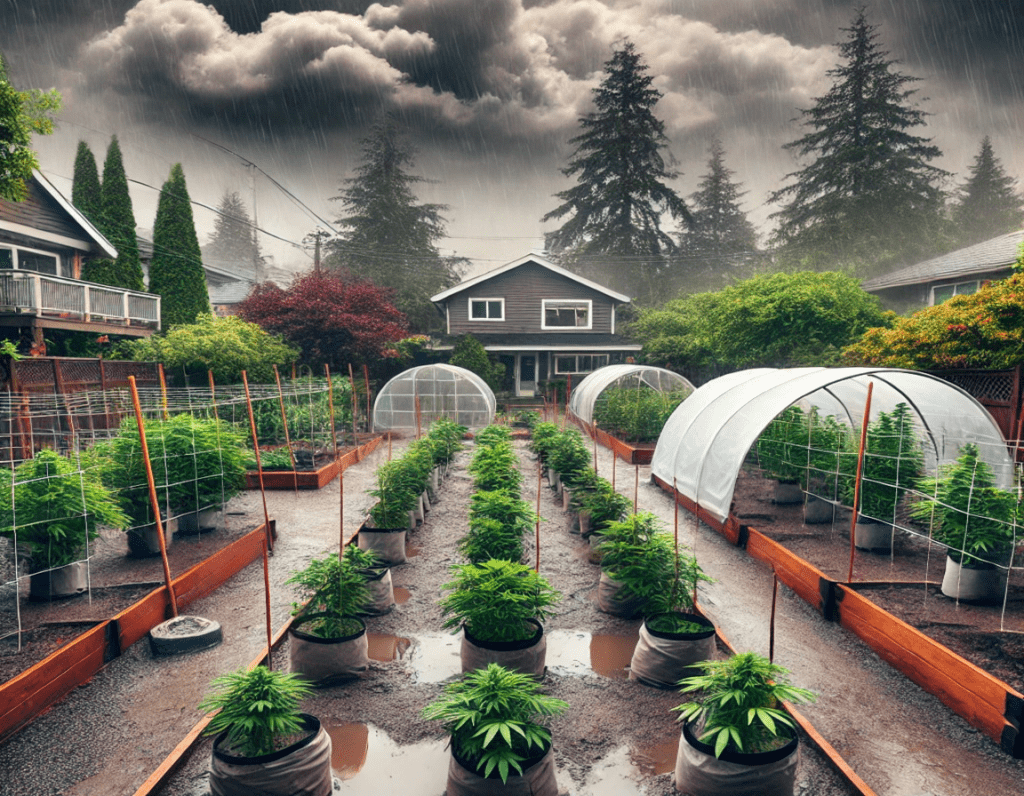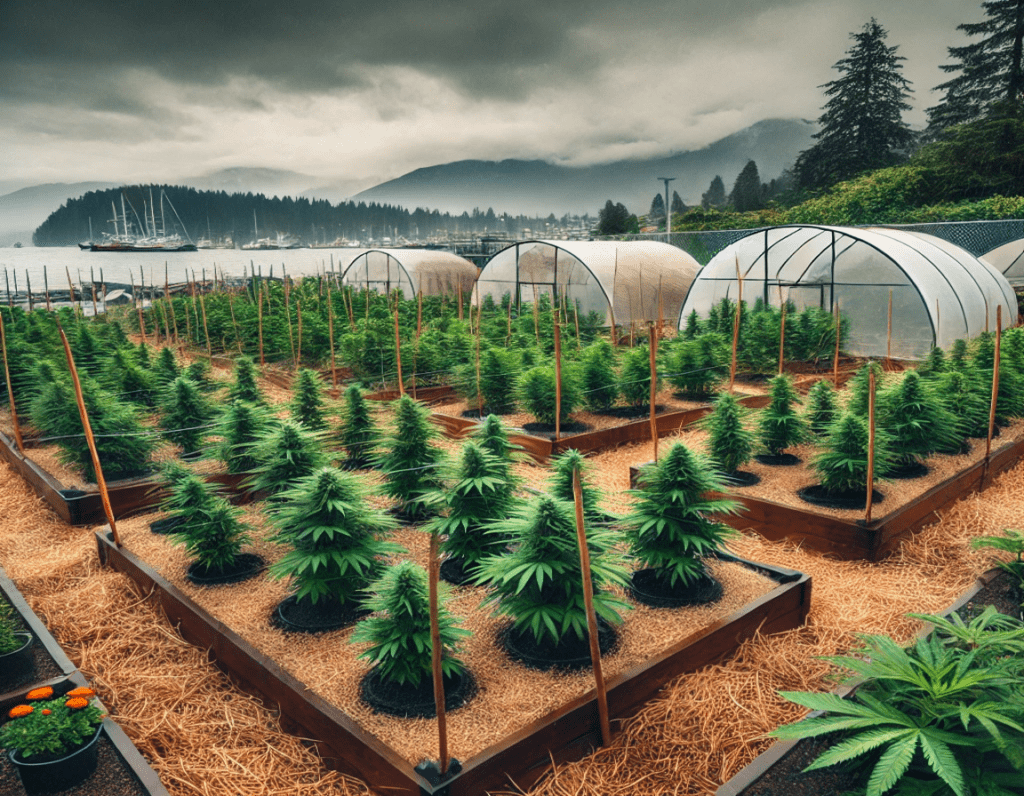
Growing outdoor marijuana seeds in Vancouver requires careful attention to local climate conditions, including maximizing sunlight exposure and adapting to specific challenges like humidity and temperature variations. This section explores effective strategies.
In Vancouver, daylight varies significantly throughout the year. To optimize sunlight exposure, consider the orientation of your garden. South-facing slopes or spots with minimal shading provide the best light throughout the day.
Using reflective materials such as aluminum foil or mylar sheets around your plants can boost light penetration, especially in areas that experience partial shading. Keep in mind the changing sun angles with the seasons; regular adjustments might be necessary.
Additionally, analyze the sunlight patterns during different seasons. Using simple tools like a sun chart or downloadable apps can help you plan plant placements to ensure they receive adequate light. Consistent sunlight is crucial for healthy growth and maximizing yields.

Vancouver’s climate presents unique challenges; high humidity and rainfall are common. Adequate drainage is crucial to prevent waterlogging, which can cause root rot. Elevate plants or use raised beds to improve drainage.
Invest in strains that are resilient to mold and mildew. Strain selection is vital as some varieties handle the moist climate better than others. Research on these strains can offer better chances of success.
Implementing a regime that monitors temperature changes is important. Sudden shifts, especially during unpredictable spring and fall months, can stress plants. Applying mulches can help maintain soil temperature, protecting roots from sharp fluctuations. These adaptations aim to boost plant resilience and ensure continued health throughout the growing season.
For successful outdoor cannabis cultivation in Vancouver, choosing the right strain is crucial. Consider factors like the type of strain and the local climate to maximize yields. Below, explore key considerations when selecting strains best suited for this region.
Photoperiod strains rely on light cycles to progress through growth stages. In Vancouver, where daylight hours vary significantly, managing light exposure is essential. These strains can produce high yields but require careful monitoring.
Autoflowering strains, in contrast, transition from vegetative to flowering stages based on age, not light. They are ideal for multiple harvests in a single season. Their compact size makes them suitable for smaller spaces, but yields might be less than photoperiod varieties.
Vancouver’s climate is mild and humid, which can influence your strain choice. Select strains that are resistant to mold and disease, as this weather can increase susceptibility. Strains like Northern Lights and Durban Poison have shown strong adaptability to these conditions, making them ideal for outdoor growing tips Vancouver enthusiasts.
Consider high-yielding strains with robust genetics, as their ability to thrive in outdoor settings ensures larger, more consistent harvests. Balanced strains that offer both sativa and indica attributes can also provide versatility in effects and growing conditions, catering to diverse preferences.

Vancouver’s coastal climate is characterized by high humidity and frequent rainfall, which can cause issues like waterlogged soil, root rot, and mold. Managing these conditions is essential for maintaining healthy plants.
Excessive moisture can cause cannabis plants to suffer from root rot, especially if the soil does not drain well. Using raised beds or planting in large containers with drainage holes helps ensure that water drains away from your plants’ roots, reducing the risk of waterlogging.
Mulching is an effective way to manage moisture levels in the soil. Organic mulch, such as straw, wood chips, or compost, helps retain moisture during dry spells while preventing excess water from sitting on the soil’s surface during heavy rains. Mulch also helps regulate soil temperature by insulating roots, which is particularly important during Vancouver’s cooler nights.
Organic Mulches: Materials like straw, wood chips, or compost not only help regulate moisture and temperature but also decompose over time, enriching the soil with nutrients.
Vancouver’s climate is generally mild, but temperature fluctuations, especially in early spring or late fall, can stress cannabis plants. Monitoring weather forecasts and preparing for temperature changes will help protect your plants.
Mulch for Temperature Regulation: Mulch acts as insulation, keeping soil temperatures more consistent during periods of sudden cold or heat.
Frost Protection: During early spring or fall, when frost is possible, protect your plants using row covers, cold frames, or low tunnels. These structures create a warmer microclimate around your plants and shield them from cold temperatures.
Selecting strains that are naturally resistant to mold and mildew is important in Vancouver’s humid climate. Here are some strains that are well-suited for outdoor growing in the region:

Vancouver’s high humidity creates a favorable environment for mold and pests, so effective pest management and mold prevention are essential to ensure a healthy cannabis crop.
Mold can develop quickly in areas with poor air circulation, especially during Vancouver’s rainy season. Here’s how to reduce the risk:
Pruning and Spacing: Pruning excess foliage, particularly around the lower branches, improves airflow around your plants and reduces moisture buildup. Properly spacing your plants also ensures that air can move freely between them, further reducing the chances of mold developing.
Protective Shelters: Consider building temporary structures such as hoop houses, plastic tunnels, or tarps to protect your plants from heavy rainfall. These shelters can help prevent moisture from accumulating on your plants, reducing the risk of mold.
Vancouver’s outdoor cannabis plants are vulnerable to pests like aphids, spider mites, and caterpillars. Implementing natural pest management techniques can help protect your plants without using harmful chemicals.
Companion Planting: Certain plants, such as marigolds, basil, and garlic, can repel common pests when planted alongside your cannabis. Companion planting improves garden biodiversity while naturally deterring pests.
Organic Insecticides: If pests become an issue, organic insecticides like neem oil are effective and safe to use. Neem oil is non-toxic to beneficial insects like bees and can help control aphids, spider mites, and other pests that might harm your plants.
Beneficial Insects: Introducing beneficial insects such as ladybugs or predatory mites can help control pest populations naturally. These insects feed on harmful pests, keeping your cannabis plants safe without the need for chemical treatments.

The timing of your cannabis harvest is critical in Vancouver, especially as the rainy season approaches. Harvesting too late can lead to mold development, while harvesting too early can result in a lower-quality yield.
Photoperiod Strains: Monitor your plants closely as they approach harvest time. The best way to determine when to harvest is by examining the trichomes (resin glands) on your buds. In Vancouver, aim to harvest your photoperiod strains before the heavy fall rains begin to minimize the risk of mold.
Autoflowering Strains: Autoflowering strains typically have shorter lifecycles, allowing you to harvest multiple times in a single growing season. Because these plants flower based on age, they often finish before Vancouver’s rainy season sets in, reducing the risk of mold or mildew.
Once harvested, it’s important to cure your cannabis properly to prevent mold and ensure high-quality buds.
Drying Environment: Dry your cannabis in a well-ventilated space with low humidity. Keeping the humidity level between 45-55% is ideal for preventing mold while drying your buds. Proper airflow is essential during the drying process to avoid moisture buildup.
Inspecting for Mold: Regularly check your drying buds for any signs of mold. If you notice mold forming on any of your buds, remove the affected areas immediately to prevent the mold from spreading to the rest of your harvest.
Strains like Northern Lights, Durban Poison, Frisian Dew, and Blueberry are well-suited for Vancouver’s high humidity and cooler temperatures. These strains are naturally resistant to mold and mildew, making them ideal for the region.
Photoperiod strains offer higher yields but require careful light management and need to be harvested before the rainy fall season. Autoflowering strains are a good option for Vancouver’s unpredictable weather as they flower based on age, allowing multiple harvests in a season. However, their yields may be smaller compared to photoperiod strains.
Plant your cannabis in south-facing areas to capture maximum sunlight. Consider using reflective materials like mylar or aluminum foil to increase light penetration. Additionally, monitor seasonal sun patterns using tools or apps to optimize plant placement.
To prevent waterlogging, use raised beds or large containers with drainage holes to ensure proper drainage. Improve soil with materials like perlite or vermiculite for better water flow. Ensuring your plants aren’t sitting in stagnant water is crucial for healthy root systems.
Pruning excess foliage and ensuring proper plant spacing helps improve airflow and prevent mold buildup. Companion planting with pest-repelling plants like marigolds and basil can naturally deter pests. Organic solutions such as neem oil and introducing beneficial insects like ladybugs also help manage pests without harmful chemicals.
We ship and deliver world wide via USPS and various couriers.
We offer a wide range of secure and anonymous online payment options.
We care about you, our customer. Please contact us with any questions or concerns.
Find out more about the benefits of being a loyal and regular customer.
WE ARE EVERY GROWERS ONE STOP SHOP TO ACQUIRE PREMIUM CANNABIS SEEDS FOR SALE IN THE USA, CANADA AND AUSTRALIA

Farmers Lab Seeds 2024, | All Right Reserved
Seeds are sold as novelty items, souvenirs, and collectibles. They contain 0% THC. We encourage our customers to check the legislation in their Country, State, Province, and Municipality prior to purchasing items from our store. We do not provide growing information.
All seeds are sold as hemp, and lab tested under 0.3% THC. This product is not for use by or sale to persons under the age of 21. This product should be used only as directed on the label. It should not be used if you are pregnant or nursing. Consult with a physician before use if you have a serious medical condition or use prescription medications. A Doctor’s advice should be sought before using this and any supplemental dietary product. All trademarks and copyrights are property of their respective owners and are not affiliated with nor do they endorse this product.
These statements have not been evaluated by the FDA. This product is not intended to diagnose, treat, cure or prevent any disease. Individual weight loss results will vary. By using this site, you agree to follow the Privacy Policy and all Terms & Conditions printed on this site. Void Where Prohibited by Law.